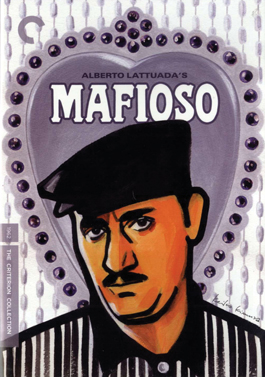home | metro silicon valley index | movies | current reviews | dvd review

Mafioso
One disc; Criterion Collection; $29.95
By Michael S. Gant
Long before Analyze This and The Sopranos, Alberto Lattuada's 1962 comedy Mafioso went to the source island for a dark comedy about a modern Milanese man (Alberto Sordi) who gets back to his Sicilian roots in all the wrong ways. Lattuada (1914–2005) is known mostly for co-directing Variety Lights with Fellini, but Mafioso shows that he was a master filmmaker in his own right, albeit much less showy than more famous exports like Fellini, Antonioni and Visconti. Sordi's Nino works at an auto plant, toting a clipboard and stopwatch; he's married to a lovely blonde (Bardot-esque Norma Bengell) and has two blonde daughters. But a trip to Nino's home village on Sicily exposes a societal chasm. Nino enthusiastically welcomes the land of Cyclops while his wife laments that "Italy is slipping away." Sicily looks magnificent in cinematographer Armando Nannuzzi's widescreen black-and-white vistas—all sun-baked stone and cactus-covered rubble walls—but it is hardly a vacation paradise. Nino's relatives are a querulous bunch. Dad lost his hand in a suspicious accident; some people must be avoided for unspecified lapses in honor. In a bit of forced stereotyping, Nino's sister is saddled with a mustache that is ruining her marriage prospects. We soon learn that Nino hasn't really left his past behind. He is floridly servile to the local don (a wonderful performance by Ugo Attanasio), whose courtly manners barely conceal the message that no request can be refused. As a boy, Nino once ran errands for the don, and now the don has a new, deadly assignment for him. Nino wants to be a big man showing off for his rustic pals, but he is easily reduced to wide-eyed cowering when the don applies the screws. The film turns a gimlet eye on both the criminality of the Mafia and the soullessness of modern life—the opening and closing factory scenes, with their close-ups of inexorable machinery, imply that Nino is just part of an assembly line, whether he's meeting a production schedule or doing the Mafia's bidding. A very funny scene drives home the point. Some beachfront idlers carry on an unexpected debate about Sicily's psychological isolation vs. the industrialized alienation of the north. "But aren't we all alienated?" asks one of the men. The extras include a fascinating 1996 interview with Lattuada, who confesses his love for black-and-white "because it 'steals' more" from reality; and interviews with his wife and son; there is also a booklet with a critical essay by Phillip Lopate and a discussion about changing Italian attitudes toward the Mafia by Roberto Chiesi.
Send a letter to the editor about this story.
|
|
|
|
|
|